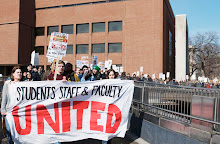Barbara Coffin, head of the film unit at the U's Bell Museum of Natural History, described the TW fiasco as "our messy internal confusion" to the Star Tribune. She added, "Unfortunately, an impulsive late-hour decision to pull the film from broadcast was made without wide internal discussion." The STRIB also reports that The Minnesota Center for Environmental Advocacy has filed a legal request to obtain information about why the documentary was canceled.
David Brauer of the Minnesota Post reports on other cases of industry influence on the U, which resulted in the pulling of a story by a writer who had previously written an article that included some criticism of ethanol. Himle was involved in this case as well and also invoked the word "balance." (Seems like university relations understands balance as giving industry's perspective the same weight as peer-reviewed science...)
Molly Priesmeyer of the Daily Planet tackles the academic freedom angle, with some choice quotes from this blog and Cary Nelson:
"Perhaps Minnesota's public relations office hopes to deflect attention from Troubled Waters by creating a troubled campus," said Nelson, author of the book No University is an Island: Saving Academic Freedom.
"Academic freedom applies to creative projects like films, just as it applies to conventional research," Nelson said. "Of course, if the filmmakers agreed contractually to some form of oversight or approval by the University, that's another matter. If not, the PR office's action is both bizarre and unacceptable."
Bizarre and unacceptable indeed. She also had the opportunity to view a copy of the film in the possession of one of the major funders of the project.Finally, the Daily published an op-ed about "Troubled Waters" in today's paper.


Has anyone considered that the trouble with "Troubled Waters" is that it was produced by a unit that was formerly part of the College of Natural Resources which had a very different mission and constituency than the newly created CFANS?
ReplyDeletePerhaps the administration of CFANS needs to broaden their view of their mission beyond mission of COAFES, which was "“The goal of the College of Agricultural, Food, and Environmental Sciences is to provide students with varied educational experiences and an environment that promotes professional competence, the capacity to attain career success in agriculture, including food or related professions, and a sense of social responsibility.”
Anonymous...can you say more? your comment is intriguing but I can't quite make out the substance of your critique of the COAFES mission...the social responsibility part sounds good...
ReplyDeleteI think much of this mess can be attributed by the ham-handed merger of the two colleges. You may note that all of the administrators quoted in the Daily have their roots in the old COAFES
ReplyDeleteThe College of Natural Resources' mission was "to foster a quality environment by contributing to the management, protection, and sustainable use of our natural resources through teaching, research, and outreach."
My opinion is that CFANS is just COAFES having to put up with the old CNR departments but not making any accommodation for the old CNR units or their constituencies.
To whit, the Bell Museum's mission statement "is to advance the quest to discover, document, and understand life in its many forms and to inspire curiosity, delight, and informed stewardship of the natural world."
Currently, CFANS does not have a mission statement though they are doing strategic planning.
This is very illuminating, thanks for your comment. If you wish to make contact with other faculty who are interested in reforming the U, please consider attending our meeting this Thursday, 4pm, in Soc Sci 1314.
ReplyDelete